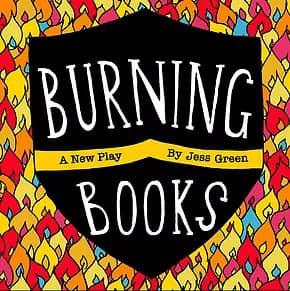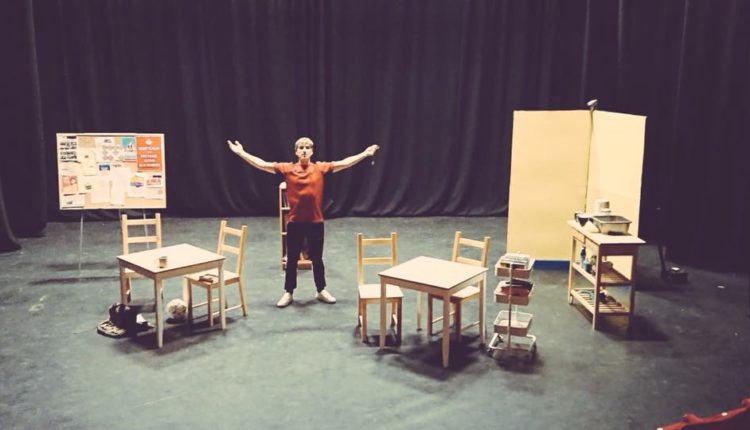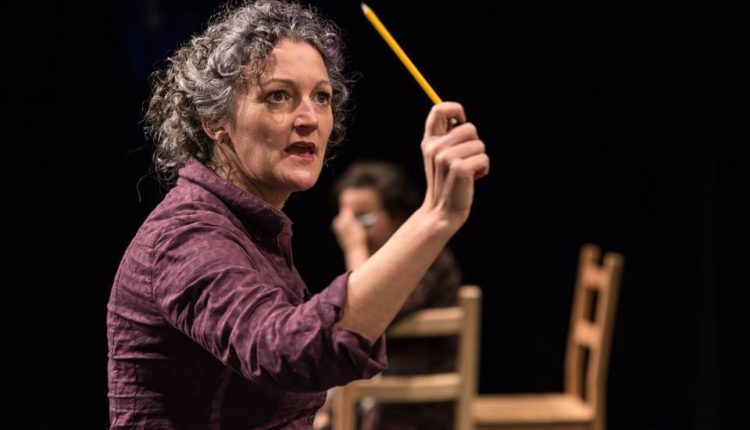BURNING BOOKS ON HOPE STREET: MONDAY NIGHT CHAOS IN THE STAFFROOM!
‘Keep Calm and Michael Gove is a Tosser’ in a big red poster nearly centre-stage, the kind of set design that may well make you think ‘this is going to be interesting’ as you huddle into Liverpool’s newest fringe theatre venue on a chilly night in mid-November. It could indeed be said that Burning Books is a very interesting play, but would it fan the flames and warm the hearts of the Monday night audience at the Hope Street Theatre? LVL hides all the books, wraps up tight and braves the encroaching cold to find out…
Written by Jess Green and directed by Neil Reading, Burning Books came to the Hope Street Theatre on Monday 19th November for the Liverpool leg of its national tour, presenting a show about teachers struggling in an under-resourced, under-valued and constantly undermined secondary school in the midst of special measures where headteacher Dom, a business executive drafted in to help the failing school, dispenses disembodied proclamations to the staff through a tannoy.
 Set in 2015, the action takes place in the school’s staffroom as Kat, a Teach First student played by Hayley Thornton, arrives full of anticipation for her first day and soon encounters the wily and battle-weary Janine, NUT representative and head of ‘numerical logistics’ aka maths.
Set in 2015, the action takes place in the school’s staffroom as Kat, a Teach First student played by Hayley Thornton, arrives full of anticipation for her first day and soon encounters the wily and battle-weary Janine, NUT representative and head of ‘numerical logistics’ aka maths.
Played by Therese Collins, working-class Janine, lifelong inhabitant of the same estate that many of the school’s students come from, seems to take an instant dislike to the shy, nervous middle-class Kat with her ‘welcome to me’ almond brownies. ‘There’s no nuts allowed here – it’s on the noticeboard!’ teases Janine, as she hoovers up Jaffa Cakes instead and complains about Luke, one of the sports teachers, who has left his cup on the table.
Next we meet Scott, played by Conor Dean, a sports assistant and Luke’s friend who quickly develops a keen eye for the new trainee teacher, ‘Kit-Kat’, as he calls her, much to her annoyance. Last but not least, we encounter Blue Merrick’s utterly bonkers administrator-cum-librarian Mrs. Sizzly, who sets herself to the task of ‘stock-checking’ the library catalogue in homage to then education secretary Michael Gove. Googling each of the books in turn, Mrs. Sizzly is horrified by the ‘filth’ in pretty much every classic book on the shelves, such as ‘ Jane Eyre – I don’t even want to know what he was doing with that woman in the attic!’, ‘To Kill a Mockingbird – full of rape!’ and ‘Black Beauty – a disturbing obsession with horses’. She plots to rid the school of what she sees as profane literature after Gove’s remarks about how there were too many undesirable books in schools and in hope of impressing the new head, Dom, who has replaced her as PA with a younger, inexperienced but buxom secretary.
Googling each of the books in turn, Mrs. Sizzly is horrified by the ‘filth’ in pretty much every classic book on the shelves, such as ‘ Jane Eyre – I don’t even want to know what he was doing with that woman in the attic!’, ‘To Kill a Mockingbird – full of rape!’ and ‘Black Beauty – a disturbing obsession with horses’. She plots to rid the school of what she sees as profane literature after Gove’s remarks about how there were too many undesirable books in schools and in hope of impressing the new head, Dom, who has replaced her as PA with a younger, inexperienced but buxom secretary.
The play ostensibly follows Kat’s journey as she struggles to get to grips with classes out of control and the bewildering bureaucracy around her while navigating the ever caustic staffroom politics. A student member of the NUT, Kat gets fired up over talks of a strike in response to the government’s plans for forced academisation, yet Janine is having none of it, preferring instead to fight the fires around her.
Meanwhile, Mrs. Sizzly plots, skives and siphons away the library’s literature, as Kat becomes increasingly agitated, butting heads with Janine over the union’s role, and Scott grows more and more concerned about Luke, whose cup remains untouched on the table and appears to have gone missing. Before long, Dom gives out his latest proclamation, one which threatens their very staffroom as the school pushes forth with its ‘budget reallocation initiative’. As a play that sets you thinking about the disastrous mismanagement of the education system the Tory government has overseen, it stands out as a rare and unflinching attempt to address such an important issue, an often bleak but occasionally heartening production that lays bare the problems inherent in a system that has lost sight of its aim to foster and inspire learning. In managing ever-changing quantifiable targets instead of the complexities of human understanding, and with budget cuts coming thick and fast, the teachers are being robbed of their ability to educate.
As a play that sets you thinking about the disastrous mismanagement of the education system the Tory government has overseen, it stands out as a rare and unflinching attempt to address such an important issue, an often bleak but occasionally heartening production that lays bare the problems inherent in a system that has lost sight of its aim to foster and inspire learning. In managing ever-changing quantifiable targets instead of the complexities of human understanding, and with budget cuts coming thick and fast, the teachers are being robbed of their ability to educate.
Adapted from the highly acclaimed poem ‘Dear Mr. Gove’ following interviews with teachers by poet and musician Jess Green, this award-winning play has resonated with educators around the country who experience the same daily battles and frustrations. For many in the audience, the play was at times very funny, and flashes of what seemed to be a kind of mutual empathy could be seen flitting between audience members, including from teachers present who perhaps recognised aspects of their own learning environments. The hopelessness of the situation however becomes increasingly palpable as the saga draws on, leading to a tragic conclusion that leaves hanging the question of what is to be done.
While not exactly an uplifting tale, and where hope lies is dismally unclear (although the books about Jeremy Corbyn on sale on the way out – in itself a curious image amidst the Masonic paraphernalia displayed around the theatre’s corridor – perhaps provides a suggestion or intent), Burning Books is in any case a challenging and entertaining piece of theatre that seeks to interrogate the many problems in the education system and devastating realities they create and, if for that alone, it has a rare and precious value. Warming up gradually as the night progresses to a fiery and anguished crescendo, Burning Books is truly an interesting, impassioned and thought-provoking production that is definitely worth checking out!
Check out Burning Books on FACEBOOK
Check out more at the Hope Street Theatre ONLINE
Images Courtesy of Jess Green, Arena Theatre and the Hope Street Theatre

